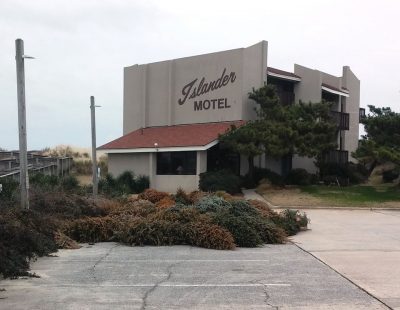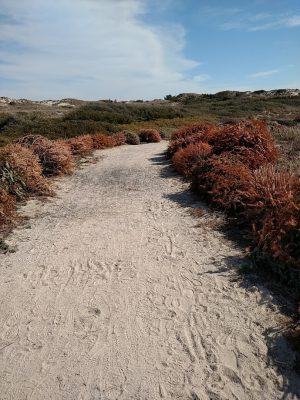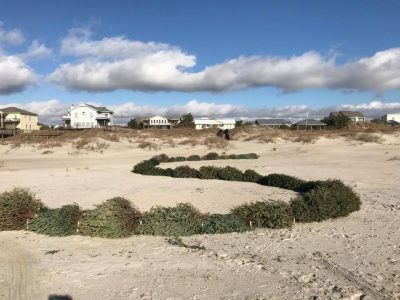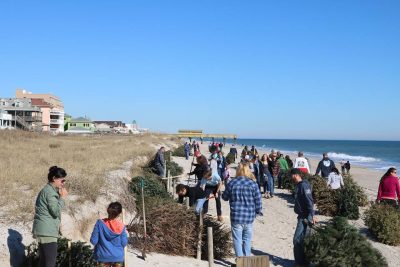
COASTAL NORTH CAROLINA – Fresh-cut Christmas trees once decorated for the holidays are being returned to nature, now that the season is coming to a close.
Several towns and organizations are collecting the trees that will be used for dune stabilization and restoration or the trees are being turned into mulch.
Supporter Spotlight
On the Outer Banks, Better Beaches OBX has since 2013 collected trees for use in dune restoration projects.
Better Beaches OBX founder Donny King explained that the organization uses the trees that are dropped off at the parking lot of The Islander Motel in Nags Head and Ocean Boulevard Bistro and Martini Bar in Kitty Hawk, where King is chef and owner.
King added that this year, Boy Scout Troop 117 in Kitty Hawk has offered to pick up trees from houses on Saturday and Sunday. The Scouts will deliver the trees to Better Beaches OBX. Text the address to 252-202-4949 or 252-202-1672 for pick up and let them know where the tree is located. The Scouts are accepting tax deductible donations that can be taped in an envelope to the door.
King said that the trees, which are strategically placed at the bottom of the sand dunes or in low spots to collect sand, are buried halfway or placed against existing structures like a sand fence to keep the tree from moving.
“Better Beaches OBX also provides consulting as to how to trap sand in more desirable areas around oceanfront homes and businesses and teaching people how to plant and distribute the proper dune grasses,” he said. “Most of our time is spent planting American beach grass during the fall/winter months with a large group of volunteers. We also plant sea oats in the spring in more established areas.”
Supporter Spotlight
Oceanfront owners wanting to learn simple processes to protect their property from low- to mid-level impact storms, volunteers and those wishing to donate to the organization can contact Better Beaches OBX via the group’s Facebook or email bbobxfriends@gmail.com.
“We are aware that out time on the Outer Banks is limited, and larger storms can change everything, but we believe we can make an impact (and this has been proven in recent years) by better maintaining our shoreline. The wind blows in a lot of different directions throughout the year and using that power to build up desired areas through mostly natural means pays off,” King wrote in an email.
Nags Head and Kitty Hawk are collecting the natural trees from residents.
Ralph Barile, public works director for Nags Head, said that the town will collect the natural Christmas trees, which will be used for mulch, or a resident can request the trees be delivered to be used for dune stabilization. Curbside collection is by appointment. Call 252-441-1122 to schedule.
Willie Midgett, public works director for Kitty Hawk, said that the town collects trees and are stored at the public works building, where trees may also be dropped off. Residents that want the trees for dune stabilization are welcome pick them up. He added that Better Beaches OBX also uses the trees for their projects.
Kill Devil Hills will begin Jan. 9 collecting natural Christmas trees. No later than Jan. 8 should the undecorated tree be placed in the right-of-way adjacent to the property.
Steve Albright, public services director for Kill Devil Hills told Coastal Review Online that the trees are available for use for beach stabilization. “We sometimes have some interest in them and allow them to be recycled. Any left, will be added to the limb pile and mulched to be used for landscaping.”
Dare County Manager Bobby Outten said that Dare County does not have a recycling program for trees. Residents of the unincorporated area of the county including Wanchese, Hatteras Island, Colington, Martin’s Point, East Lake and Stumpy Point are encouraged to bring their used Christmas trees to either the Buxton or Manteo Recycling collection centers, where it can then be recycled into mulch, according to a statement.
Southern Shores town manager Peter Rascoe said that that the town does not have an official program for natural tree recycling. The trees may be placed in the limb and branch piles for collection by Southern Shores, though wreaths will not be collected, according to information from Dare County.
Duck’s Waste Management will collect trees from residents Jan. 7 and Jan. 14 and Manteo residents should have the trees curbside by Jan. 10 and Jan. 15 for the town to collect.
Currituck County Manager Dan Scanlon explained that although the county has had a recycling program in the past, “We do not have a plan this year to utilize Christmas trees for dune growth and stabilization.”
Hyde County, according to Donnie Shumate, the county public information officer, does not have a program, but “I do think it is a great idea and will bring it up at our next meeting with the National Parks Service since they manage the beaches in Ocracoke.”
Fort Macon State Park in Atlantic Beach has had a successful tree recycling program in place since the 1960s.

Paul Terry, park ranger with Fort Macon State Park, said they collect about 2,000 trees each year, and in the five years he’s been at the park, that number has been fairly consistent. The fort will wrap up collecting trees on Jan. 27.
Ranger Paul Branch explained that depending on the year and what the park’s needs are, they set aside times for individuals and groups to come help put out the trees.
“We use our own park staff, Boy Scouts, church groups, and groups of U.S. Marine and Coast Guard personnel. It is very labor intensive loading up and dragging trees out on the beach. It is so early we have not determined our needs for this year,” Branch added.
“The trees are placed in wind erosion areas to build up sand. The trees stop wind-blown sand and cause the sand to build up in and around the trees,” Branch said. “Eventually the trees will be completely covered, and more trees will be added over them in successive years to keep building up the sand. In this way, new sand dunes are created, and wind-damaged dunes are repaired.”
Terry added that the trees are usually placed in the “Sand dunes where erosion is taking place at a higher rate than normal, or where we want to encourage dunes to grow larger to protect important locations,” Terry said. “We will place the trees in these areas and they act much like a sand fence. As wind blows sand into the trees, the many branches will catch some of the sand making it accumulate around the tree. Trees that are placed in areas that see fairly constant wind can be buried so deep that you can’t move them by hand in just a week or two.”
Park Ranger Randy Newman explained that the trees also provide nutrients to the soil. As the trees decay, allowing beach grasses to claim the area quickly, the beach grasses form a root mass that helps rebuild the dunes.
He added that the park sometimes has areas used frequently by visitors, which can cause the loss of vegetation. The park places the trees in these areas to stop the wind from blowing the sand. The trees also provide cover for song birds that deposit their droppings in the soil, which contains seeds. “The tree again provide nutrients and hold some water, which cause the grasses to return. The tree decays and the final product is a vegetative dune.”
Terry said that, over the long term, this has been a very successful program. The fort has been contacted over the years by several different agencies working on copying the program.
“We started doing this in 1964 by the park staff getting trees out of the town dump to use for erosion control. It worked so well they continued doing this in successive years. Finally we needed so many we began calling for the public to bring in their old trees and it has become an annual event,” said Branch. “Other communities have contacted us over the years to get information on how to start Christmas tree recycling programs of their own.”
Newman said that they have to attempt to limit tree donation from just the local area. “We receive calls from all over eastern North Carolina where groups want to collect trees in their neighborhood and bring them to the park.”
For anyone wishing to donate a tree, Terry added, make sure to triple check your tree for ornaments. “Every year we get quite the collection of left-behind ornaments that have to be thrown away.”
Terry said that the fort is only collecting natural Christmas trees, and asks that folks not bring wreaths, yard brush or hurricane debris. He also wanted to make emphasize that the trees should be delivered intact, even if it’s cut in half or thirds. A bare trunk doesn’t work for catching sand and helping the dunes.
Pine Knoll Shores also collects natural Christmas trees to be used for dune health.
Sarah Williams with the town said that the natural trees can be dropped off at the parking lot of the Iron Steamer beach access, 350 Salter Path Road. Town staff will collect the trees to place on the beaches.

In Emerald Isle, natural Christmas trees placed curbside will be picked up as part of the weekly yard debris collection.
Oceanfront residents can place their natural Christmas trees in the dunes to promote sand accretion, and are welcome to use the discarded trees from the curbside as well, according to a release from the town. Residents are asked to be careful not to impede public access or vehicular access on the beach strand.
Folks also can deliver trees to the Eastern Ocean Regional Beach Access, 2810 Emerald Drive, until Jan. 11 to be used by the Surfrider Foundation’s Bogue Banks Chapter. The group will use the trees to help restore structure to the dunes in Emerald Isle.
Volunteers of all ages can join in the effort by meeting at 9:30 a.m. Jan. 11 at the Eastern Regional Beach Access.
In Surf City, natural trees with all the lights and ornaments removed can be brought to 214 N. New River Drive through Jan. 25 and stacked neatly beside the garage in rear parking lot. The trees will be used to promote dune system health and improvement, according to a post on the town’s Facebook. For more information, call 910-328-4131.
North Topsail Beach residents, property owners and visitors can bring their trees to the New Jeffries lot at 315 New River Inlet Road for three weeks following Christmas. Once the trees are collected, town staff and volunteers will place the trees along the oceanfront to facilitate and promote sand accumulation, according to a release from the town. Volunteers should contact Cameron Kuegel at clkuegel@gmail.com.
Pender County residents can bring the natural Christmas trees with all lights and ornaments removed to the Rocky Point Convenience Center at 16232 N.C. 210 from 7 a.m. to 7 p.m. on Mondays, Tuesdays, Thursdays, Fridays and Saturdays or the Hampstead Convenience Center, 250 Transfer Station Road, 7 a.m. to 7 p.m. Mondays through Saturdays and 1-7 p.m. Sundays.
“We will accept Christmas trees through Jan. 15,” said Kenny Keel, Pender County Public Utilities director, in a statement. Christmas trees left in storm-related debris piles will not be accepted by the contractor.
Onslow County Solid Waste & Landfill will collect the trees, which will be used for mulch, for a small fee, or trees can be delivered to 415 Meadowview Road in Jacksonville from 6:30 a.m. to 5 p.m. Monday through Saturday.
Possumwood Acres Wildlife Sanctuary in Onslow County’s Hubert is accepting real Christmas trees without decoration to be used in the animal cages for insulation and enrichment, per the organization’s Facebook. Trees can be dropped off from 11 a.m. to 5 p.m. any day of the week at the at the facility, 119 Doe Drive.
Marine Corps Base Camp Lejeune announced via Facebook that it will not be accepting recycled Christmas trees for Onslow Beach.
Surfrider Foundation Cape Fear Chapter has coordinated with Carolina Beach to rebuild dunes using natural Christmas trees. The annual project is set this year for 11 a.m. to 2 p.m. Jan. 26. Volunteers should bring a shovel, tape measure and scissors and meet at the Ocean Grill and Tiki Bar in Carolina Beach.

Cape Fear Surfrider Foundation has collected trees for the past five years and average about 100 a year, Kevin Piacenza, the organization’s chairman, told Coastal Review Online. Coming up on the program’s sixth year, he estimates the organization has placed 500-600 trees.
“Last year we did nearly 150 and we are expecting to increase that number this year to 200,” he said. Carolina Beach delivers the collected trees to the beach access.
Piacenza said that the organization relies on volunteers to bring a hammer and shovel.
“We had about 120 people last year and based on interest may have even more this year,” he said. “It’s popular with families.”
The volunteer will place the trees about 10 feet apart, just on the front slope of the dune field. Then, the tree is staked and tied off with twine, with the front third buried in the sand, he explained. The trees are angled to catch sand moving from north to south, because the northeast is most effective wind direction. Sea oats are planted in the late winter or early spring in rows along the line of trees.
“It’s really been very effective, and most of our work has remained in place despite the impact of northeasters and hurricanes,” he said, adding that the town and residents have been very appreciative.
Through the New Hanover County Environmental Management Department, in collaboration with the Wilmington Sanitation Department and Home Depot, residents can recycle their natural Christmas trees, with the lights and decorations removed, through Jan. 15.
“We want to provide residents who live in the unincorporated areas of the county, outside of city limits, with the option to recycle their live Christmas trees,” said Environmental Management Director Joe Suleyman in a statement. “They are biodegradable and we are able to recycle them into mulch or compost.”
Trees can be dropped off in Wilmington at Home Depot, 5511 Carolina Beach Road; Home Depot, 210 Eastwood Road; and New Hanover County Landfill, 5210 US Highway 421 North. The trees collected by the county will be used for mulch and compost, said Jessica Loeper, communications and outreach manager with the county.
If you know of a natural Christmas tree recycling program that should be added to this list, email the details to jennifera@nccoast.org.







